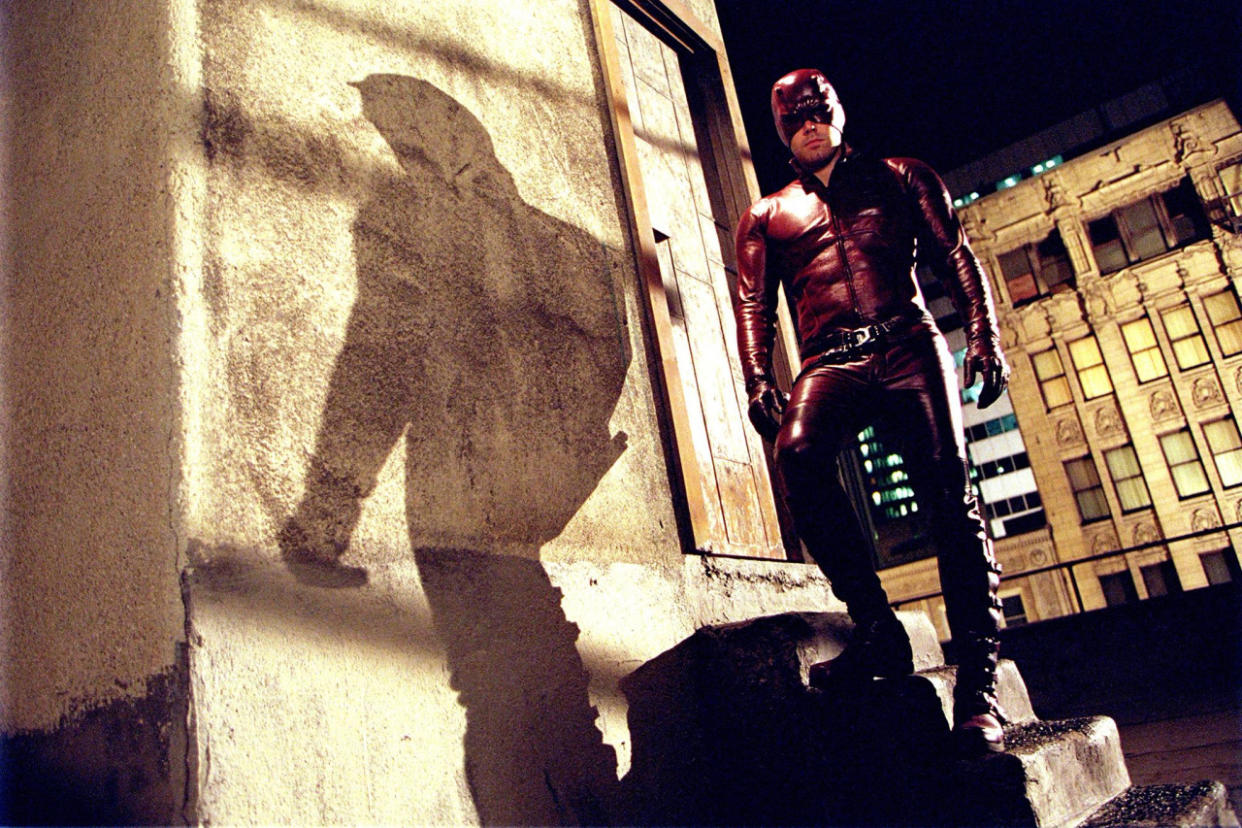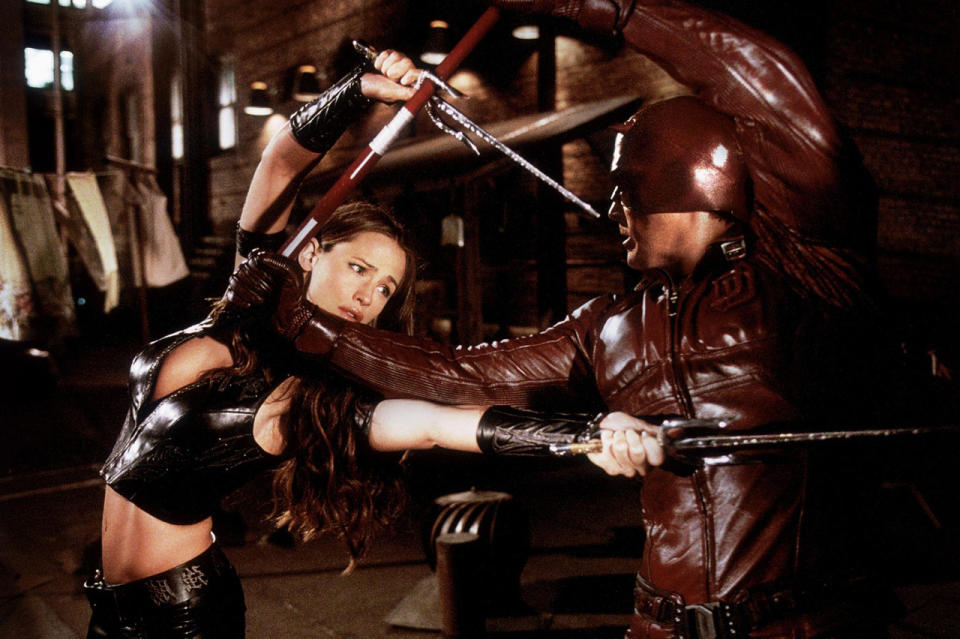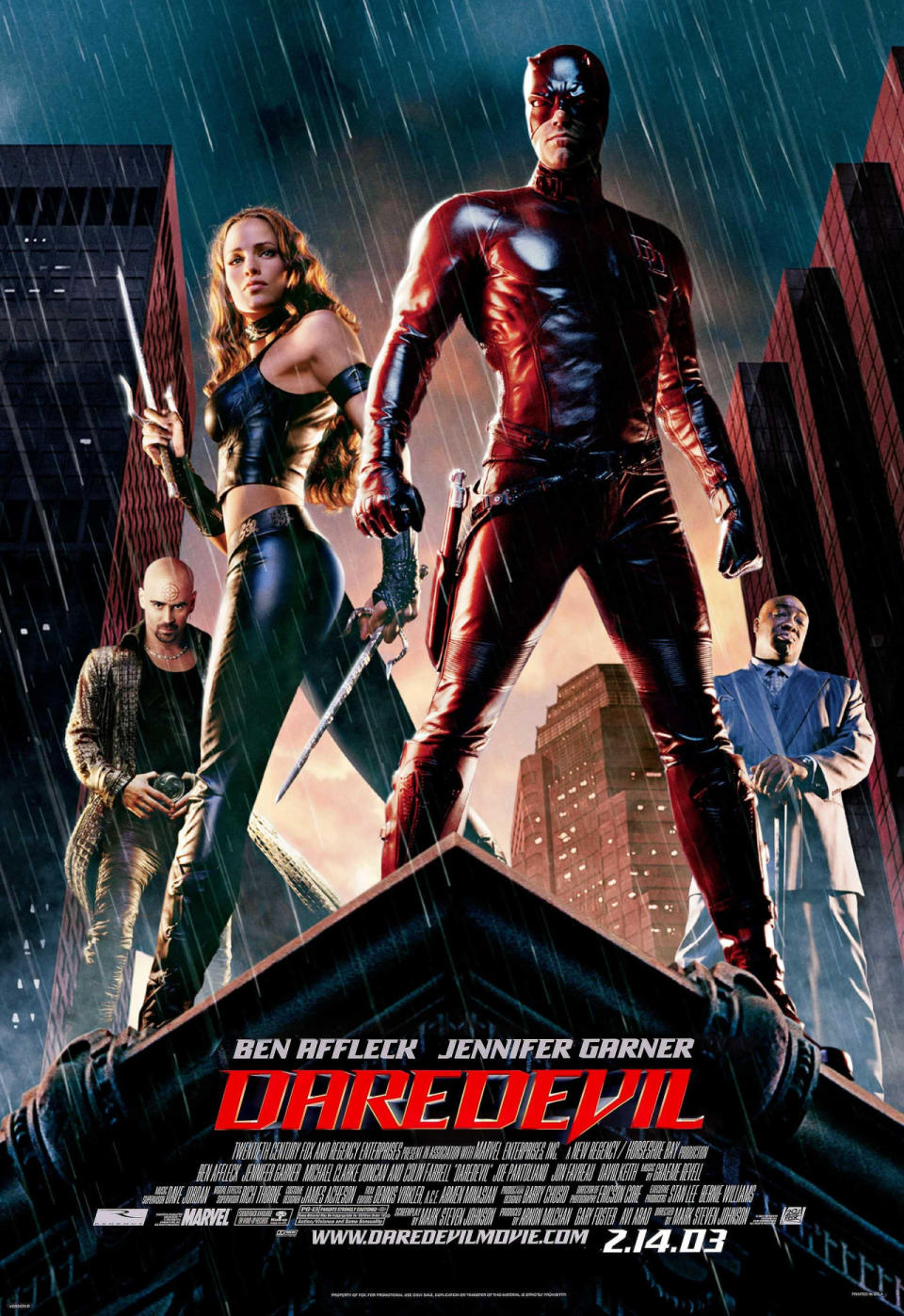Revisiting 'Daredevil': Is the Movie (and Ben Affleck) Really as Bad as We Remember?

Affleck’s portrayal of a tormented hero was supposed to launch a franchise
Batman v. Superman: Dawn of Justice will bring about a reckoning between two iconic D.C. superheroes — yet the shadow of a lesser Marvel character still hovers over Zack Snyder’s film. Prior to playing Batman, Ben Affleck starred as the blind defender of Hell’s Kitchen in 2003’s Daredevil. The film, and Affleck’s performance in particular, was widely derided by comic fans, which is why the actor is now bending over backwards to distance himself from it. “The only movie I actually regret is Daredevil,” Affleck said in his Playboy interview. “Look, if I thought we were remaking Daredevil, I’d be out there picketing myself,” he told NPR. Coincidentally, a new Daredevil series is coming to Netflix, and the producers of that show are also clamoring to separate themselves from the Affleck film. Which raises the obvious question: Is Daredevil actually as bad as everyone remembers?
Related: ‘Batman v. Superman’ Producer: Ben Affleck Was Always Our First Choice to Play the New Dark Knight
I streamed the director’s cut of Daredevil over the weekend, and I can confirm that it’s not a good movie. The direction (by Mark Steven Johnson, of Jack Frost fame) is hackneyed, the story doesn’t quite hold together, and some of the most unique aspects of the Daredevil character – his struggles with the criminal-justice system as alter-ego lawyer Matt Murdock, the challenges of his handicap, his intense Catholic guilt, his ties to his gritty Manhattan neighborhood – are all but glossed over. (The director’s cut does improve slightly on the theatrical version by including a subplot about Matt Murdock’s legal career.) Affleck’s performance is serviceable, considering the script’s general lack of character development and atrocious dialogue. (Example: “Hey, that light at the end of the tunnel? Guess what, that’s not heaven. That’s the C train.”)

Affleck, with ‘Daredevil’ costar (and future wife) Jennifer Garner
That said, Daredevil has one key thing going for it: Ambition. This was Marvel’s first attempt to turn a minor superhero, one without the instant name recognition of a Spider-Man or Batman, into a movie franchise – something they’d eventually accomplish with Iron Man, and again with Guardians of the Galaxy. At this point in time, there had been two very successful Marvel superhero films (not counting the horror franchise Blade): X-Men in 2000, and Spider-Man in 2002. Sequels were in the works, and Marvel was aggressively expanding its movie universe by developing properties for the Incredible Hulk, Fantastic Four, and so on. Daredevil was an attempt to round out that universe with a darker, more mature superhero – territory that DC would later lay claim to, thanks to Christopher Nolan.
In fact, Daredevil’s inner conflict, while poorly executed, is not unlike that of the Dark Knight-era Batman: Daredevil spends the film wrestling with the idea of being a “bad guy,” and agonizing how to keep that darkness at bay. “Can one man make a difference? There are days when I believe, and others when I have lost all faith,” Matt Murdock ponders in a voiceover, having just pushed a criminal in front of a train. The movie’s climatic battle takes place in a cathedral, and in more capable hands, this might have been a functional metaphor.

Despite its ambitious elements, Daredevil can seem oddly small and self-contained in comparison with recent Marvel films. Though Marvel was trying to bring its comic pantheon to the screen – and indeed, Daredevil was given a spin-off film, 2005’s Elektra – the only superhero that matters in Daredevil is Matt Murdock himself. The film’s first 20 minutes tell his origin story, and the audience spends much of the movie in his head – sometimes literally, as in the roto-scoped scenes that represent Daredevil’s sonar vision. There is no attempt to look outside the character and see a bigger picture, as later Marvel movies would take pains to do, bringing out the Shakespearean mythology in Thor,and the political machinations of Captain America and Iron Man. And certainly, there is no indication that Daredevil and the X-Men might exist in the same universe. (They still don’t, but that’s because different studios own the movie rights. At the time Daredevil was made, they were both properties of 20th Century Fox.)
Related: The Latest Look at Ben Affleck on the Set of ‘Batman v. Superman’
Also contributing to Daredevil’s claustrophobic feel are Johnson’s very obvious attempts to make the film look like a comic book. Given that Ang Lee attempted the same thing with 2003’s Hulk, I’d imagine that part of Marvel’s mandate was to remind audiences of the source medium. Throughout Daredevil, Johnson allows the camera to fixate and freeze on the kinds of images that might appear in a single comic-book panel – a rose thrown by Kingpin onto a grave, for example. Sometimes the colors are enhanced for emphasis. It’s an admirable idea to try and fuse the perspectives of comics and films, but the result just makes the film seem mannered and stilted. The constant and distracting name-dropping of comics creators doesn’t help. Thankfully, Marvel Studios seems to have moved on quickly from this idea.

It should be noted that Daredevil, however poorly it is remembered, was a modest hit — earning just over $100 million in its domestic run — which demonstrated that there was an audience for a less cartoonish superhero movie. Also worth noting: Without Daredevil, there would literally be no Iron Man. Actor and director Jon Favreau, who played Matt Murdock’s law partner Franklin Nelson in Daredevil, used the opportunity to get in with former Marvel Studios CEO Avi Arad. Favreau was gunning to direct Captain America, but when Arad offered him Iron Man instead, he took the lessons of Daredevil to heart. “I want the film to play on a global level dealing with governments and politics. This is in contrast to Spider-Man or Daredevil, which deal with vigilantes fighting violent crime on a local level,” Favreau said in a 2006 interview, adding that his Iron Man movie would, tonally “land somewhere between Nolan’s Batman Begins and Raimi’s Spider-Man.”
Favreau, of course, found the winning combination — and Iron Man would become the turning point for Marvel Studios, establishing a dynamic superhero universe with endless room for expansion. That’s what DC seems to be hoping to get out of Batman v. Superman, which will be followed by a Justice League film in the vein of The Avengers. That’s a lot to put on Affleck’s shoulders, but he’s been through this before – and you know what they say about the devil you know.
Photo credits: ©Everett

